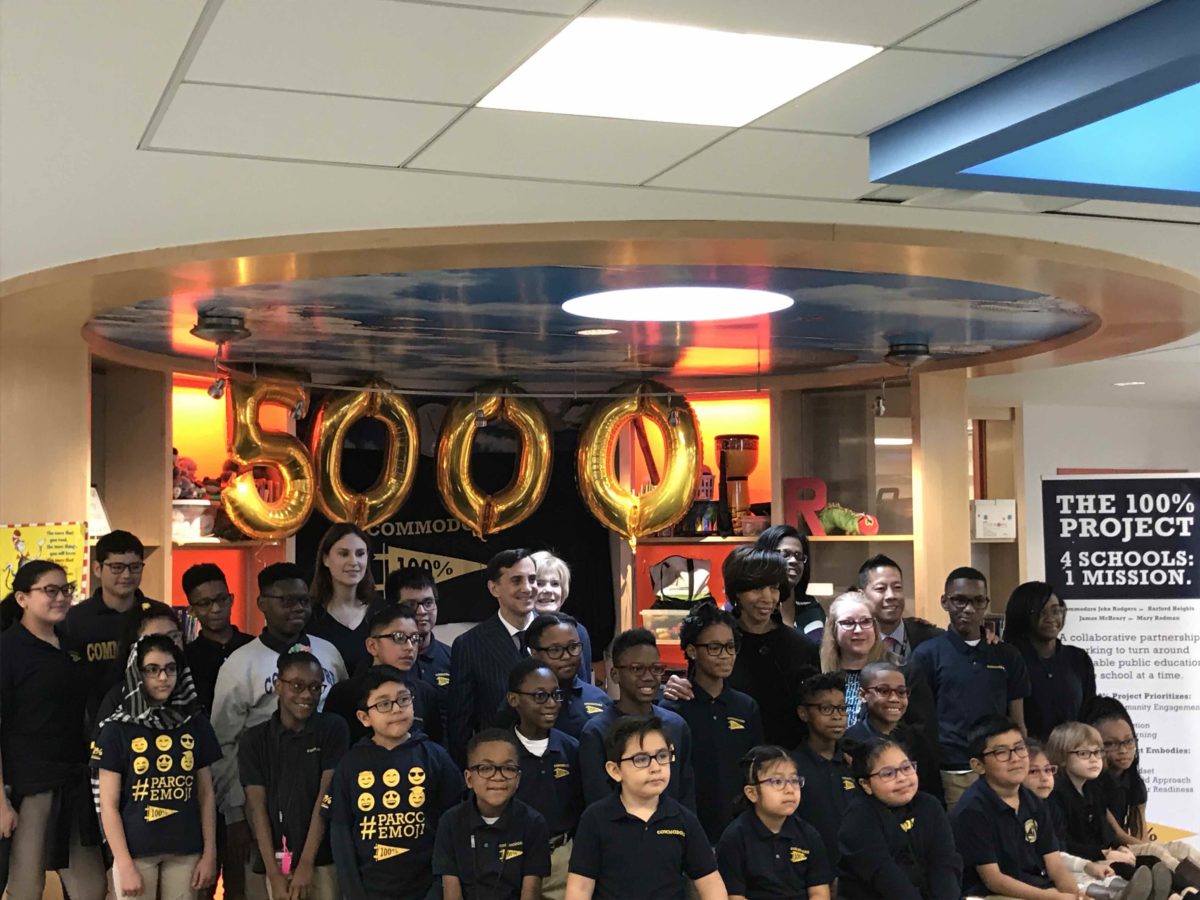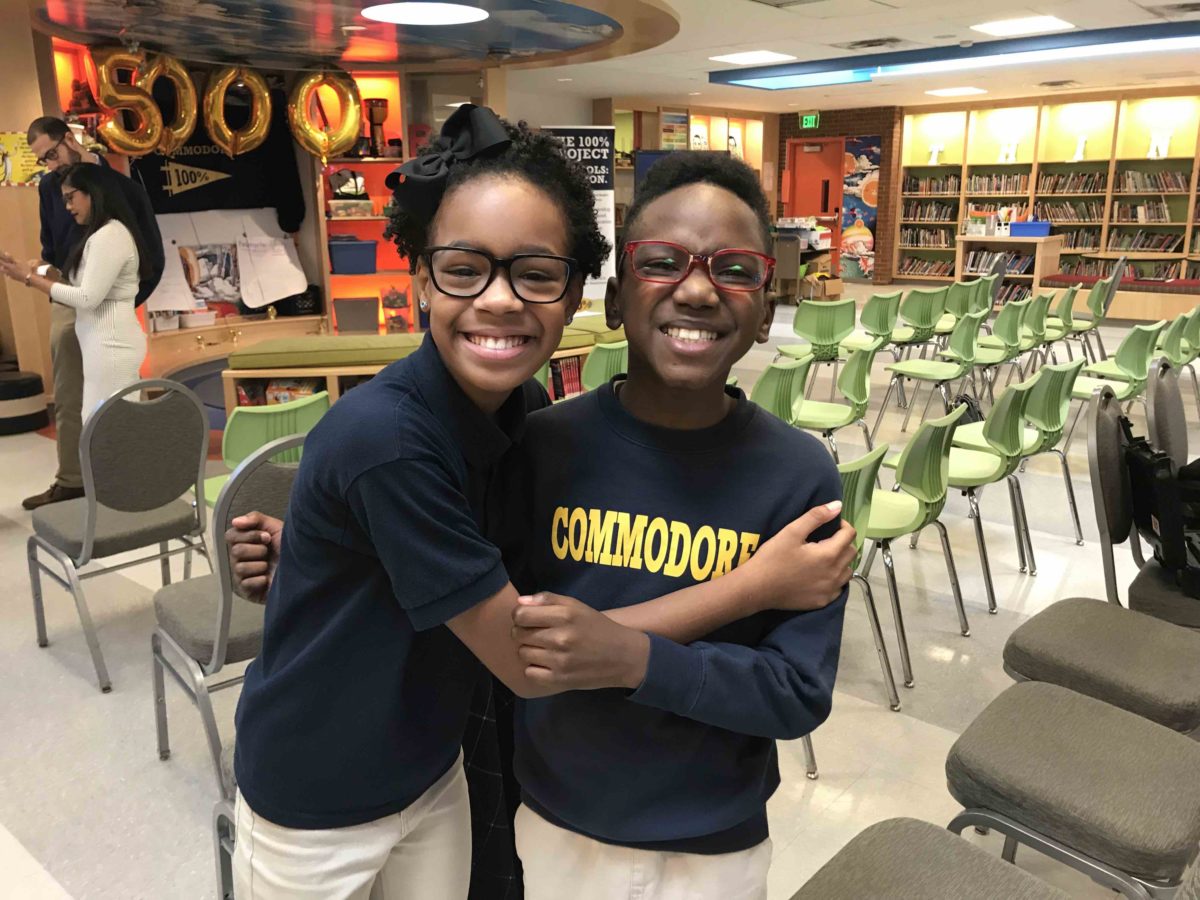Glori Mahammitt got a free pair of Warby Parker glasses on Monday morning.
As Mahammitt put on the spectacles and gave a nod of approval to Mayor Catherine Pugh and an assembled crowd at the school’s library, the fifth grader at east Baltimore’s Commodore John Rodgers Elementary/Middle School became the 5,000th student to see clearer with the help of Vision for Baltimore.
The program initially launched in May 2016 through a partnership between Warby Parker, the Baltimore City Health Department, Johns Hopkins University, Baltimore City Public Schools, and the nonprofit Vision To Learn.
In about 18 months since it began, it has provided free screenings to 45,000 students in pre-K – 8th grade at 103 schools, said Interim Baltimore City Health Commissioner Mary Beth Haller.
“That is about the size of a full crowd at Camden Yards,” Haller said. At Commodore John Rodgers, about 800 students received screenings, and 200 received eyeglasses, said Marc Martin, the school’s principal. The school aims to provide students and families with resources they need, and the “Vision for Baltimore initiative strengthens Commodore’s community school approach,” Martin said.
Leaders believe the program will help in the classroom. Researchers at JHU’s Wilmer Eye Institute found that an initial group of second and third grade students who received glasses improved in reading. Along with potential to fall behind, additional research notes that a lack of access to glasses could lead students to be misdiagnosed with behavorial disorders. Vision impairment can manifest itself in different ways that don’t seem connected to eyesight. Warby Parker Head of Social Innovation Jesse Sneath shared the story of a student who was known to be talking and disruptive in class, but was actually asking other students to see their notes.
“Providing a pair of glasses can radically transform a student’s academic, social and future economic potential,” Sneath said.

Officials including Mayor Catherine Pugh and JHU President Ronald Daniels joined Commodore Rodgers School students who received glasses through Vision for Baltimore. (Photo by Stephen Babcock)
Under state law, pre-K, first-and eighth-graders are required to receive basic vision screenings, but lack of access to transportation or healthcare can make the next step of getting glasses more difficult.
“We all saw a relatively obvious and in some ways simple problem,” said Johns Hopkins President Ronald Daniels. “…We knew that [students] were being screened but at the end of the day, not everyone who needed glasses was getting glasses. What has come together in response to that awareness is really amazing.”
With the program, all students in pre-K-8th grade receive a free vision screening provided by testers from the health department. Students who need a full screening are then referred to an optometrist from Vision To Learn, which provides exams through a mobile clinic onsite.
If students are determined to need glasses, they receive a pair of Warby Parker specs, which were donated by the brand that was cofounded by Hopkins alum Jeffrey Raider. The glasses are provided at no cost to families, and can also be repaired if damaged and replaced if lost, which Martin noted was a “special” part of the program.
Warby Parker created a special collection of glasses for the students, with the option to pick the frames they prefer. “Kids have been particularly excited about the purple frames inspired by the Baltimore Ravens,” Warby Parker’s Sneath said.
The data provided by the program could also prove valuable. Further research and evaluation is being conducted by a team of academic researchers from the JHU School of Education and Wilmer Eye Institute. They’re further testing the hypothesis that receiving glasses helps students improve reading, and overall academic performance.
“The world is a very different place when you are a young person and you can see,” said City Schools CEO Sonja Brookins Santelises, who told the story of how learning changed for her when she first received of glasses. “It makes you feel better about who you are as a student. It makes you look around and see the possibilities.”
Funding for the program provided by the Abell Foundation, the Annie E. Casey Foundation, the Hackerman Family, the Aaron and Lillie Straus Foundation, Congressman John K. Delaney, April McClain-Delaney and the Capital Source Foundation, and the Eli and Edythe Broad Foundation.
The public-private partnership is aiming to visit all Baltimore elementary and middle schools by the end of 2019, which would means about 60,000 students will receive screenings.
“It is the partnerships that is what make these kinds of programs work,” Pugh said.
Join our growing Slack community
Join 5,000 tech professionals and entrepreneurs in our community Slack today!
Donate to the Journalism Fund
Your support powers our independent journalism. Unlike most business-media outlets, we don’t have a paywall. Instead, we count on your personal and organizational contributions.

National AI safety group and CHIPS for America at risk with latest Trump administration firings

How women can succeed in male-dominated trades like robotics, according to one worker who’s done it

Geomapping goes splat: The evolving future of Google Earth


